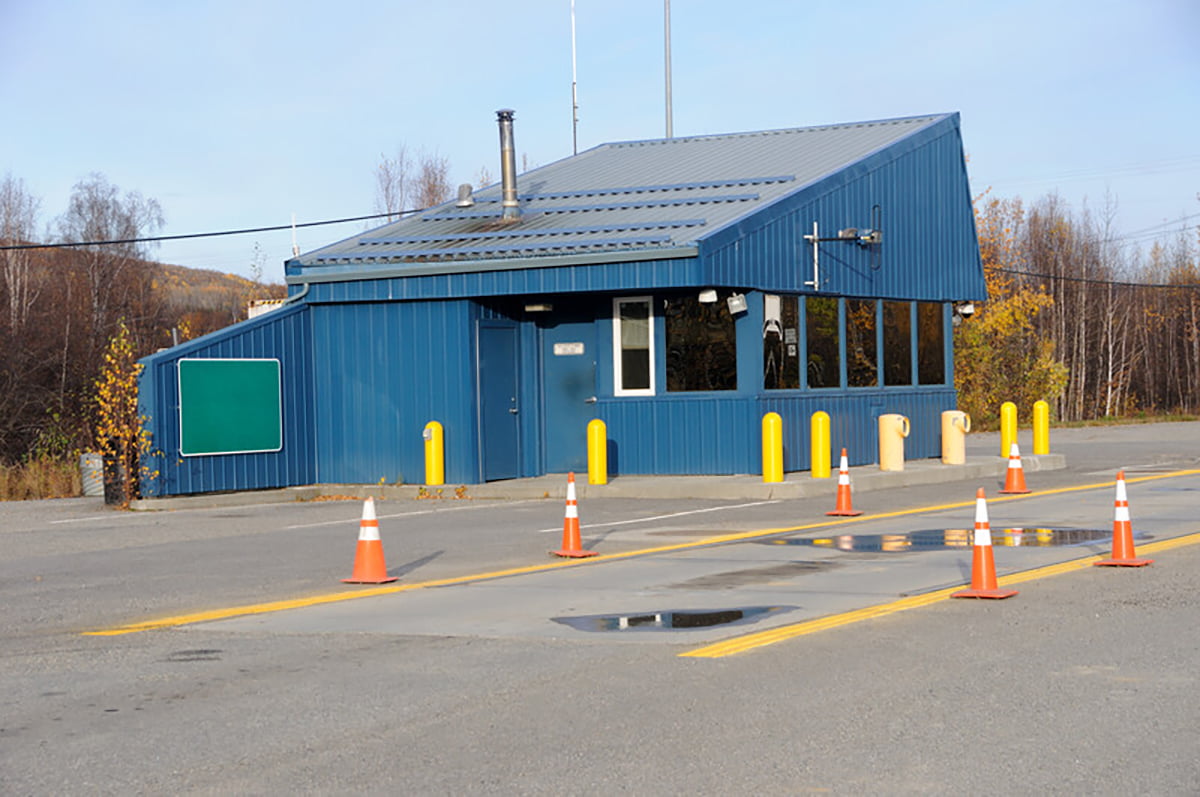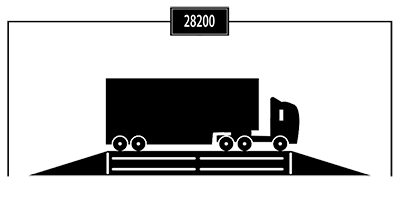Everything You Need to Know About Truck Weigh Stations
Are you a commercial driver looking to learn more about truck weigh stations? Truck weigh stations are an important part of the CDL process, and drivers must understand how they work. Weighing your vehicle at these checkpoints can help ensure that your cargo is secure and that you follow all safety regulations. In this blog post, we’ll explore what truck weigh stations are, how to prepare for them, what happens during a visit, the benefits of using one, and resources for learning more about them. Get ready to take your knowledge of truck to weigh station operations up a notch.
Table of Contents:
- How to Prepare for a Truck Weigh Station Visit
- What Happens During a Truck Weigh Station Visit?
- Benefits of Using a Truck Weigh Station
- Resources for Learning More About Truck Weigh Stations
- FAQs
- Conclusion
How to Prepare for a Truck Weigh Station Visit
Pre-Trip Checklist for Drivers:
Before entering a truck weigh station, drivers should check their vehicles and cargo to ensure everything is in order. Before entering a truck weigh station, drivers should check that their brakes, lights, tires, and other components are in working order and have all necessary documents, such as their CDL license and medical certificate, to ensure they do not exceed any applicable weight limits. Additionally, drivers should verify that they have all required documents, including their CDL license and medical certificate. Finally, it’s important to ensure that the truck’s gross weight does not exceed any applicable weight laws or limits, as this could lead to hefty fines or, even worse if caught by law enforcement officials.

Required Documentation for Entry into the Weigh Station: Truck drivers must present specific documentation before entering a weigh station. These include proof of registration for themselves and their commercial vehicles and insurance coverage from an approved provider. Additionally, drivers may be asked to provide information about their cargo, such as its size and weight, to verify it against federal motor carrier safety administration regulations.
To avoid delays at weigh stations, it is best practice for truckers to know what types of trucks are typically pulled over by highway patrol officers at each station they visit. For instance, on major highways, rolling scales may pull over moving trucks more often than tanker trucks due to weight restrictions on those roads. In contrast, scale houses might only allow commercial vehicles carrying hazardous materials after verifying their contents via paperwork or inspection. It is also wise for drivers to stay up-to-date on changes in state or local laws regarding maximum weights since these can vary depending on location; this could result in costly penalties if violated unknowingly.
Preparing for a truck weigh station visit is essential by having the necessary documents, performing pre-trip checks, and following tips for smooth entry. Knowing what happens during a truck weigh station visit can help you understand the process of entering and exiting and the standard procedures performed at the facility to avoid penalties for noncompliance with regulations.
Key Takeaway: Before entering a truck weigh station, drivers should thoroughly inspect their vehicle and cargo to ensure all parts are working properly and have the necessary documents. Additionally, they must be aware of applicable weight laws to avoid costly fines or penalties for violations. Truckers should stay aware of local regulations to evade any legal issues preemptively.
What Happens During a Truck Weigh Station Visit?
Truck weigh stations are an important part of the highway safety system. They ensure that commercial trucks and other large vehicles comply with weight laws and regulations. A truck entering a weigh station is weighed on rolling scales or in a scale house. The process of entering and exiting the weigh station begins when the driver stops at the entrance sign for inspection by law enforcement officers. Drivers must have all required documentation ready before entry, such as their license, registration, insurance information, and logbook if applicable. Before entering the weigh station, it is essential to ensure your vehicle is in proper working order to avoid any potential consequences for disregarding regulations.
Law enforcement officers may pose inquiries regarding your destination, point of origin, cargo type, and the like; therefore, it is essential to be prepared to answer these questions honestly and accurately. Employing active voice in this context requires you to phrase the sentence: “Be ready to respond candidly and precisely should law enforcement officers question you about where you’re heading/coming from/what kind of freight you are carrying etc.”
It is always best practice for truckers to know what they are hauling ahead of time so that they can plan accordingly before arriving at any given destination along major highways throughout America. This way, if any violations are found during an inspection at a truck weigh station visit – whether related to overweight loads or other infractions – penalties can range from fines to revoking operating authority, depending on the severity of the violation(s). In some cases, overloaded trucks may even be ordered off-road until they can be brought into compliance with weight limit requirements. This could cause delays in delivery times for customers expecting goods transported via those vehicles.
The truck weighs station visit is an important part of the CDL process, and understanding what happens during a visit can help drivers comply with regulations. The following section focuses on the benefits of using truck weigh stations for improved safety, fuel costs, emissions, and efficiency in cargo delivery times.
Key Takeaway: Be prepared to answer any questions law enforcement officers may have truthfully and accurately when entering a truck weigh station, as violations can lead to fines or revocation of operating authority. Ensure you know your cargo beforehand to avoid being weighed down with hefty penalties or having your load held up until it meets weight requirements.
Benefits of Using a Truck Weigh Station
 Using truck weigh stations offers many benefits to drivers, trucking companies, and the general public. Improved road safety is one of the main advantages of using a weigh station. Truckers must comply with rules restricting how much freight they can carry in their rigs. When trucks are overloaded, it increases their risk of an accident due to increased stopping distance or reduced maneuverability. By weighing commercial vehicles at a weigh station, drivers can be sure that their loads are within legal limits and will not put them or other motorists in danger.
Using truck weigh stations offers many benefits to drivers, trucking companies, and the general public. Improved road safety is one of the main advantages of using a weigh station. Truckers must comply with rules restricting how much freight they can carry in their rigs. When trucks are overloaded, it increases their risk of an accident due to increased stopping distance or reduced maneuverability. By weighing commercial vehicles at a weigh station, drivers can be sure that their loads are within legal limits and will not put them or other motorists in danger.
Another benefit of truck weigh stations is reduced fuel costs and emissions from commercial vehicles. Overloaded trucks require more energy to move down the highway than those carrying lighter loads; therefore, having accurate weights helps ensure that all trucks operate as efficiently as possible, reducing fuel consumption and emissions into our environment.
Using truck weigh stations has many benefits, including improved road safety, reduced fuel costs and emissions, and increased efficiency in cargo delivery times. With this knowledge in mind, let’s explore some resources for learning more about truck weigh stations.
Resources for Learning More About Truck Weigh Stations
There are several resources available for learning more about truck weigh stations. Much data on the rules and processes related to these stations and advice for going through them successfully can be found online. Organizations like NATSO strive to advance safety and effectiveness at weigh stations throughout the U.S. The FMCSA oversees and keeps up weigh stations to guarantee adherence to federal guidelines.
Online Resources:
Numerous online sources can help drivers learn more about truck weigh station operations. Websites such as WeighMyTruck provide detailed information on state-by-state regulations regarding entry into commercial vehicle enforcement areas, including maps of all active scales in each state and their hours of operation and contact information. Other websites like Trucker Path offer helpful tips on preparing for a visit to a weigh station, including ensuring you have all required documentation ready before entering the facility.
Professional Organizations:
The National Association of Truck Stop Operators is dedicated to improving industry standards at weigh stations across America by advocating for safe driving practices, efficient cargo delivery times, improved fuel economy, and reduced emissions from large vehicles on our roads. NATSO also works closely with government agencies responsible for enforcing regulations at these facilities to ensure compliance with federal laws related to size, weight limits, and other requirements specific to commercial motor carriers operating within the United States.
Key Takeaway: Several resources are available to learn about truck weigh stations, such as online sources and professional organizations like the National Association of Truck Stop Operators. These can help drivers prepare for a successful visit to these facilities by providing detailed information on regulations and procedures and tips for navigating them safely.
FAQs
What is the point of truck weigh stations?
Truck weigh stations are important checkpoints for commercial truck drivers. Weigh stations are essential for truckers to guarantee their vehicles adhere to weight regulations, which can be vital in preserving road safety and quality. By weighing the vehicle, officials can determine if the cargo load is within legal parameters or if adjustments must be made before proceeding. The data collected at these stops also helps government agencies monitor traffic flow and improve transportation infrastructure planning. Weigh stations are essential in keeping roads safe and efficient for all motorists.
Why do truckers avoid weigh stations?
Truckers avoid weighing stations because they may be subject to fines or other penalties if their vehicle is found to be overweight. Furthermore, stopping at a weigh station can cause delays in delivery times and reduce the efficiency of their route. Finally, some truckers may not want to take the time or effort required for inspections conducted at weigh stations.
Why do some 18-wheelers stop at weigh stations?
18-wheelers stop at weigh stations to ensure they comply with federal and state regulations regarding weight limits. The Department of Transportation has established a maximum weight limit for all commercial vehicles, including 18-wheelers, to ensure that other drivers on the road are not at risk. Weigh station personnel checks each vehicle’s gross vehicle weight rating (GVWR) against its actual loaded weight before allowing it to proceed. If the GVWR is overstepped, remedial steps must be taken before the truck can continue.
How accurate are truck weigh stations?
Truck weigh stations are highly accurate. The scales at these sites are precisely calibrated, usually with a deviation of 0.1% from the true weight of the truck and its cargo. Weigh station staff also ensure that each vehicle is weighed correctly by double-checking measurements when necessary. As such, truckers can be confident that their weights will be accurately measured at nationwide weigh stations.
Conclusion
Truck weigh stations are an important part of any CDL test preparation. By understanding the process and being prepared for a visit to a truck weighs station, drivers can ensure they comply with all applicable regulations while on the road. With proper knowledge and planning, truck weigh stations can benefit professional drivers and their employers by helping them comply with laws and reducing potential liabilities.
Take the CDL practice test to become more familiar with driving large vehicles, and learn how to get your CDL license so you can safely navigate through weigh stations.
Sources:
https://www.aaesqlaw.com/blog/what-is-the-purpose-of-truck-weigh-stations/
https://cdnsciencepub.com/doi/10.1139/l93-053
https://www.nordstrandlaw.com/blog/truck-accident/how-truck-weigh-stations-prevent-accidents/
